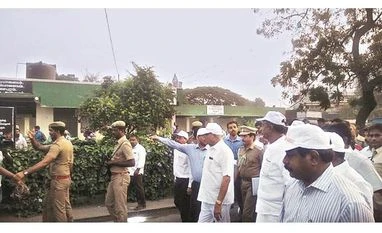The constitutionality of some actions taken by Banwarilal Purohit as governor of Tamil Nadu is being questioned by political parties. This is acquiring an additional dimension because the chief minister of neighbouring Puducherry, V Narayanasamy, has flayed the alleged interference in his work by Lieutenant Governor Kiran Bedi.
The controversies related to the role of the governor in Tamil Nadu have been a talking point for some time, from when the previous governor, C Vidyasagar Rao, was missing in the state during crucial phases following the death of
J Jayalalithaa, who was chief minister, in December last year. For example, he was absent when AIADMK leader V K Sasikala staked claim to form the government, till a Supreme Court order sent her to jail.
The latest controversies started when Purohit, who took charge recently, did a review meeting with district administration officials in Coimbatore, along with Minister for Municipal Administration S P Velumani. With various political parties raising their voice against this, the next day he led a clean-up drive at a bus stand in the district and, according to reports, proclaimed that he would do review meetings in other districts, too.
DMK Working President M K Stalin and T T V Dhinakaran, a faction leader in the AIADMK, are in the forefront of criticism, alleging the Centre is trying to interfere in the state’s administration. Stalin said the governor’s move was part of the Bharatiya Janata Party (BJP)-led central government’s plans to seize the powers of the state government.
“A governor does not have the powers of a lieutenant governor (LG). The Central government is trying to rule the state through the governor because the current AIADMK government is weak,” he said. This would result in the formation of two power centres and lead to a collapse in administration, he said.
Dhinakaran alleged the governor was acting in a manner similar to that of the LGs of Delhi and Puducherry.
PMK leader Anbumani Ramadoss, too, is of the view that the governor had overstepped his remit. Like others, he also attacked the central government and Prime Minister Narendra Modi for this.
MDMK, another regional party, has decided to send Modi a copy of a letter the latter wrote in 2011 as chief minister of Gujarat, seeking an immediate recall of the then governor, Kamla Beniwal, from the state.
However, the government of Tamil Nadu is not against the governor conducting review meetings. Chief Minister Edappadi K Palaniswami said the governor was not interfering in the government’s affairs, adding he was only familiarising himself with the functioning of various departments. He alleged opposition parties were trying to create a rift within the government.
While the ruling Palanisami-O Panneerselvam faction says there is no rift within, AIADMK Rajya Sabha member V Maitreyan hinted at a possible rupture in the recently cemented understanding between the party’s two factions.
The Panneerselvam faction is discontented because though “the understanding was to give party leadership to Panneerselvam and chief ministership to Palanisami”, the faction did not get adequate representation in the party. Maitreyan’s comment was welcomed by the leaders in the Dhinakaran faction, said sources.
Some analysts allege the governor's action is contrary to the tenets of democracy. According to Article 167 of the Constitution, the chief minister is the one to update the governor on the decisions taken by the council of ministers related to the administration and legislation. While the governor may summon an official for an update on particular developments, conducting review meetings at district level is not a healthy sign of democracy, they say.
The governor, on his part, issued a statement that he had not exceeded his jurisdiction. In this, he had taken advice from legal experts. He had done similar meetings during his previous stint in Assam, he added.
With the turmoil continues, industry feels it is not getting the same attention it had received earlier. A chief executive officer of a leading company has said that unlike in the past, the government is not following up the industry proposals on investments.
Unlock 30+ premium stories daily hand-picked by our editors, across devices on browser and app.
Pick your 5 favourite companies, get a daily email with all news updates on them.
Full access to our intuitive epaper - clip, save, share articles from any device; newspaper archives from 2006.
Preferential invites to Business Standard events.
Curated newsletters on markets, personal finance, policy & politics, start-ups, technology, and more.
)